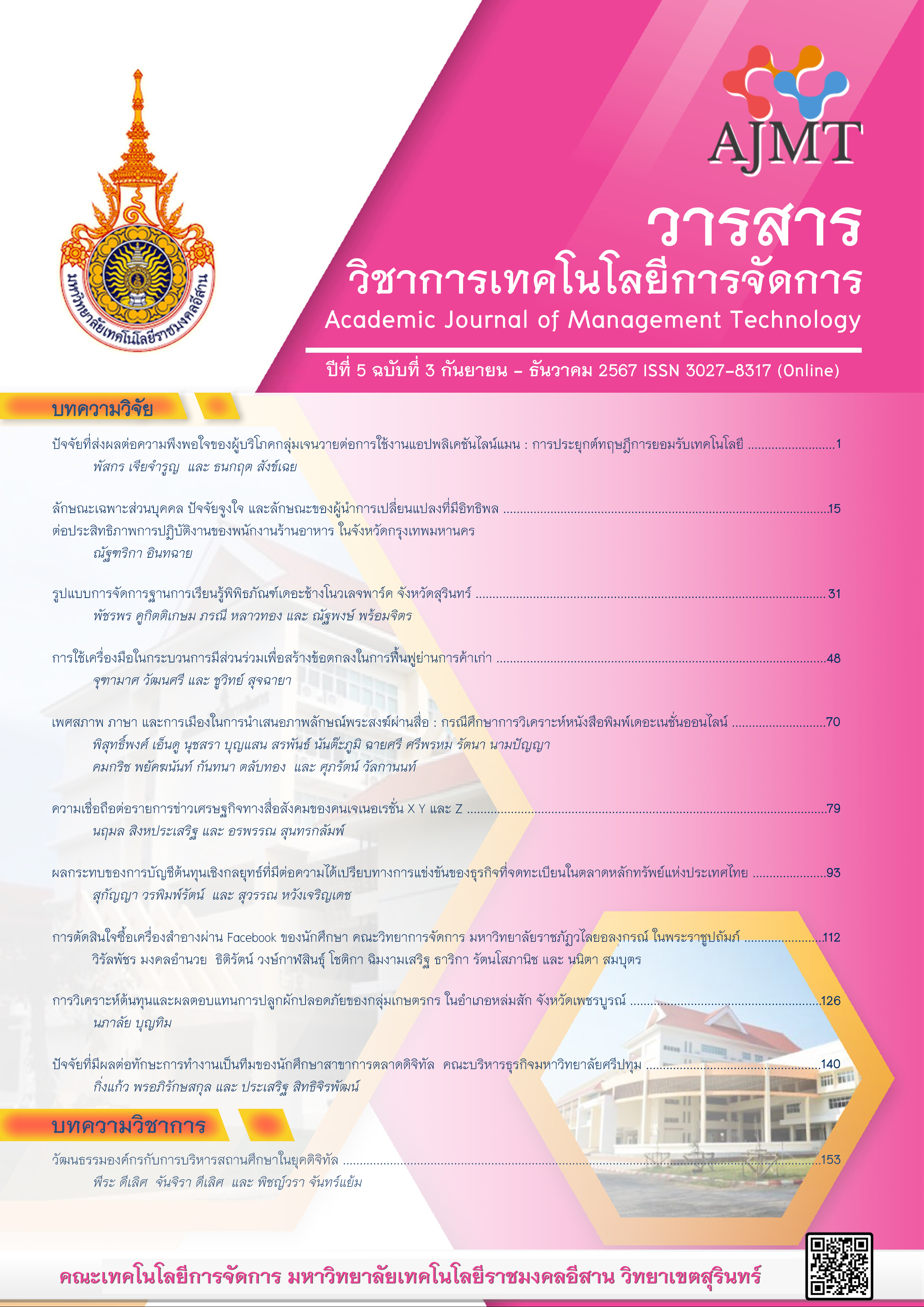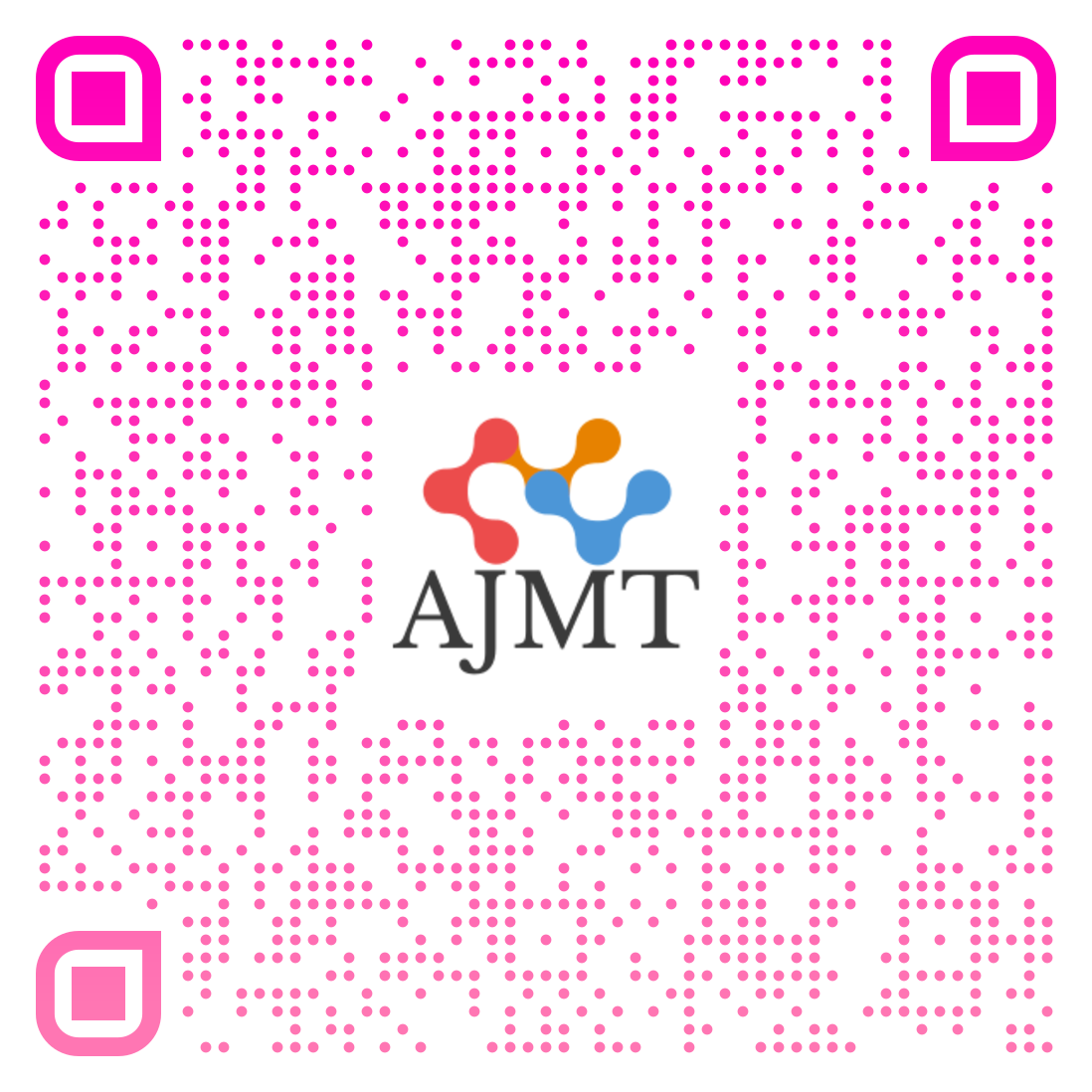ลักษณะเฉพาะส่วนบุคคล ปัจจัยจูงใจ และลักษณะของผู้นำการเปลี่ยนแปลงที่มีอิทธิพลต่อประสิทธิภาพการปฏิบัติงานของพนักงานร้านอาหาร ในจังหวัดกรุงเทพมหานคร
DOI:
https://doi.org/10.14456/ajmt.2024.23คำสำคัญ:
ประสิทธิภาพการปฏิบัติงาน , ปัจจัยจูงใจ , ลักษณะของผู้นำการเปลี่ยนแปลง , ลักษณะเฉพาะส่วนบุคคลบทคัดย่อ
การศึกษานี้มีจุดมุ่งหมายเพื่อเปรียบเทียบลักษณะเฉพาะส่วนบุคคลกับประสิทธิภาพการปฏิบัติงานของพนักงานร้านอาหารในกรุงเทพมหานคร เพื่อศึกษาปัจจัยจูงใจ และลักษณะของผู้นำการเปลี่ยนแปลงที่มีอิทธิพลต่อประสิทธิภาพการปฏิบัติงานของพนักงานร้านอาหารในกรุงเทพมหานคร โดยใช้ทฤษฎีคุณลักษณะเฉพาะส่วนบุคคล ปัจจัยจูงใจ ลักษณะของผู้นำการเปลี่ยนแปลง และประสิทธิภาพการปฏิบัติงาน ประชากรที่ใช้ในการศึกษา คือ พนักงานร้านอาหารในจังหวัดกรุงเทพมหานคร จำนวน 400 คน การเก็บข้อมูลใช้แบบสอบถามออนไลน์ วิเคราะห์ข้อมูลโดยใช้สถิติเชิงพรรณนา ได้แก่ ค่าความถี่ อัตราร้อยละ ค่าเฉลี่ย และค่าเบี่ยงเบนมาตรฐานและใช้สถิติเชิงอนุมาน คือ t-test และ F-test ในกรณีพบความแตกต่างอย่างมีนัยสำคัญทางสถิติที่ระดับ 0.05 ใช้การทดสอบรายคู่ด้วยวิธี LSD และวิเคราะห์การถดถอยพหุแบบมีขั้นตอน ผลการวิจัยพบว่า พนักงานมีระดับความคิดเห็นต่อประสิทธิภาพการปฏิบัติงานตามปัจจัยส่วนบุคคล ได้แก่ ด้านเพศ อายุ ระดับการศึกษา รายได้ และสถานภาพที่แตกต่างกันส่งผลต่อประสิทธิภาพการปฏิบัติงานที่ไม่แตกต่างกัน ผลการทดสอบสมมติฐาน พบว่า ปัจจัยจูงใจด้านการประสบความสำเร็จในงาน ด้านการได้รับความเคารพนับถือหรือยอมรับ ด้านการเติบโตและก้าวหน้าในอาชีพการงาน ปัจจัยอนามัยด้านนโยบายและการดำเนินงาน ด้านปฏิสัมพันธ์กับเพื่อนร่วมงาน และด้านปฏิสัมพันธ์กับผู้นำ และลักษณะของผู้นำการเปลี่ยนแปลงด้านการมีอิทธิพลที่เหมาะสม และด้านการพิจารณาแบบรายบุคคลมีอิทธิพลต่อประสิทธิภาพการปฏิบัติงานของพนักงานร้านอาหารในกรุงเทพมหานคร งานวิจัยนี้มีส่วนสำคัญในการแนะนำแนวทางสำหรับการกำหนดนโยบายและปรับปรุงข้อเสนอแนะภายในร้านอาหารของกรุงเทพมหานคร เน้นย้ำความสำคัญในการออกแบบแนวทางการพัฒนาที่รองรับความต้องการของพนักงาน และให้ข้อมูลในการกำหนดนโยบาย เพื่อเพิ่มประสิทธิภาพในการปฏิบัติงานและการแข่งขันขององค์กร
เอกสารอ้างอิง
Agmapisarn, C. (2023). The concept of sufficiency economy in the eyes of internal migrants under COVID-19 crisis. KKBS Journal of Business Administration and Accountancy, 7(1), 49 - 67. https://so04.tcithaijo.org/index.php/kkbsjournal/article/download/258014/178801/1018387
Angmahussagul, A., Vivadhnajat, S., & Samerjai, C. (2019). Transformational leadership and work effectiveness of employees at professional outsourcing solutions company limited. Journal of Management and Development Ubon Ratchathani Rajabhat University, 6(1), 119 - 134. https://so06.tci-thaijo.org/index.php/JMDUBRU/article/view/203215
Bagga, P. & Muangsan, U. (2022). Work motivation factors related to the decision to quit of the five-star hotel staff in Bangkok. In U-on, V., & Hadjinicola, G. C. (Eds.), Peripheries : research development and implementation. The 8th Regional Conference on Graduate Research (pp. 897 - 909). Sripatum University. http://dspace.spu.ac.th/handle/123456789/8195
Bhuyan, R., McIntyre, J., & Klieb, L. (2018). Examining the relationship between organizational culture and turnover intention : A study of a five-star hotel in Bangkok, Thailand. In 8th Advances in Hospitality and Tourism Marketing and Management (AHTMM) Conferenc (pp. 174). http://www.ahtmm.com/wp-content/uploads/2018-8th_AHTMM_proceedings_2018_1.pdf
Chaileuangleu, S. (2023). Motivation and performance that affect the confidence to be a professional Thai food chef internationally. Journal of Roi Kaensarn Academi, 8(12), 1-13. https://so02.tci-thaijo.org/index.php/JRKSA/article/view/264361
Laowirojanakul, T. (2023). The adaptation of restaurant business for existence and opportunity during the COVID-19 pandemic. Siam Academic Review, 24(1), 57-74. https://so07.tci-thaijo.org/index.php/sujba/article/view/1665
Lumkam, P. (2022). Industry outlook 2022 - 2024: Hotel business. Krungsri Research. https://www.krungsri.com/en/research/industry/industry-outlook/services/hotels/io/hotel-2022-2024
Parisuttiamorn, S. (2019). Personal characteristics and behavior leader towards working efficiency of private company employees in Samut Prakan [Unpublished master’s thesis]. Ramkhamhaeng University.
Reza, M. H. (2019). Components of transformational leadership behavior. EPRA International Journal of Multidisciplinary Research, 5(3), 119 - 124. https://eprajournals.com/IJMR/article/1310/abstract
Seriratana, S. & Sererirat, S. (2017). Marketing management. Bangkok : Educational Development.
Sriraksa, S., Thirasirikul, J., & Chitlaoarporn, C. (2022). Philosophy of social science and the analysis of Herzberg’s two - factor theory. Thai Research and Management Journal, 3(3), 152 - 162. https://so05.tcithaijo.org/index.php/TRDMJOPOlSU/article/view/261187/175790
Tanimkarn, P. & Pukahuta, P. (2022). Effects of organizational climate on work efficiency through work life quality of employees i n Suranaree Idustrial zone. Academic Journal of Management Technology, 3(1), 83 - 96.https://so03.tcithaijo.org/index.php/jomt/article/view/260315/173925
Thanaporn, P. (2022). Factors affecting work efficiency of employees in Songkhla provincial administrativeorganization [Unpublished master’s thesis]. Prince of Songkla University. http://kb.psu.ac.th/psukb/handle/2016/17458
Weerakit, N. & Beeton, R. J. S. (2018). Leadership competencies for hospitality management staff in Thailand. Journal of Human Resources in Hospitality&Tourism, 17(3), 314 - 339. https://www.tandfonline.com/doi/abs/10.1080/15332845.2017.1406277
ดาวน์โหลด
เผยแพร่แล้ว
รูปแบบการอ้างอิง
ฉบับ
ประเภทบทความ
สัญญาอนุญาต
ลิขสิทธิ์ (c) 2024 คณะเทคโนโลยีการจัดการ มหาวิทยาลัยเทคโนโลยีราชมงคลอีสาน วิทยาเขตสุรินทร์

อนุญาตภายใต้เงื่อนไข Creative Commons Attribution-NonCommercial-NoDerivatives 4.0 International License.
บทความที่ได้รับการตีพิมพ์เป็นลิขสิทธิ์ของคณะเทคโนโลยีการจัดการ มหาวิทยาลัยเทคโนโลยีราชมงคลอีสาน วิทยาเขตสุรินทร์
ข้อความที่ปรากฏในบทความแต่ละเรื่องในวารสารวิชาการเล่มนี้ เป็นความคิดเห็นส่วนตัวของผู้เขียนแต่ละท่านไม่เกี่ยวข้องกับคณะเทคโนโลยีการจัดการ มหาวิทยาลัยเทคโนโลยีราชมงคลอีสาน วิทยาเขตสุรินทร์ และคณาจารย์ท่านอื่นๆในมหาวิทยาลัยฯ แต่อย่างใด ความรับผิดชอบองค์ประกอบทั้งหมดของบทความแต่ละเรื่องเป็นของผู้เขียนแต่ละท่าน หากมีความผิดพลาดใดๆ ผู้เขียนแต่ละท่านจะรับผิดชอบบทความของตนเองแต่ผู้เดียว










